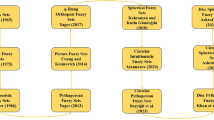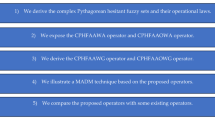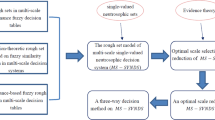Abstract
The aim of this paper is to put forward the 2-tuple linguistic soft set by combining the concepts of 2-tuple linguistic term set and soft set. The traditional set operations and corresponding properties are investigated. We develop the algebraic operations and discuss their corresponding properties based on which we introduce the applications of this theory in solving decision making problems. Four algorithms using the notion of 2-tuple linguistic soft information aggregation function are developed to handle group decision making problem. Finally, a selection problem of investment strategy is shown to illustrate the feasibility and validity of our approach.
Similar content being viewed by others
References
Alkhazaleh S, Salleh AR (2012) Generalised interval-valued fuzzy soft sets. J Appl Math. doi:10.1155/2012/870504
Alonso S, Cabrerizo F, Chiclana F, Herrera F, Herrera-Viedma E (2009) Group decision making with incomplete fuzzy linguistic preference relations. Int J Intell Systems 24:201–222
Basu TM, Mahapatra NK, Mondal SK (2012a) A balanced solution of a fuzzy soft set based decision making problem in medical science. Appl Soft Comput 12:3260–3275
Basu TM, Mahapatra NK, Mondal SK (2012b) Matrices in soft set theory and their applications in decision making problems. South Asian J Math 2(2):126–143
Borah MJ, Neog TJ, Sut DK (2012) Fuzzy soft matrix theory and its decision making. Int J Modern Eng Res 2(2):121–127
Bordogna G, Pasi G (1993) A fuzzy linguistic approach generalizing Boolean information retrieval: a model and its evaluation. J Am Soc Inf Sci 44(2):70–82
Chetia B, Das PK (2012) Some results of intuitionistic fuzzy soft matrix theory. Adv Appl Sci Res 3(1):412–423
Degani R, Bortolan G (1988) The problem of linguistic approximation in clinical decision making. Int J Approx Reason 2:143–162
Dong YC, Xu YF, Yu S (2009) Linguistic multiperson decision making based on the use of multiple preference relations. Fuzzy Sets Systems 160:603–623
Franco C, Rodríguez JT, Montero J (2014) An ordinal approach to computing with words and the preference-aversion model. Inf Sci 258:239–248
García-Lapresta JL, Llamazares B, Martínez-Panero M (2010) A social choice analysis of the Borda rule in a general linguistic framework. Int J Comput Intell Systems 3:501–513
Herrera F, Herrera-Viedma E (2000) Linguistic decision analysis: steps for solving decision problems under linguistic information. Fuzzy Sets Systems 115:67–82
Herrera F, Martínez L (2000) A 2-tuple fuzzy linguistic representation model for computing with words. IEEE Trans Fuzzy Systems 8(6):746–752
Herrera F, Martínez L (2001) The 2-tuple linguistic computational model: advantages of its linguistic description, accuracy and consistency. Int J Uncertain Fuzziness Knowl Based Systems 9(suppl):33–48
Herrera F, Herrera-Viedma E, Martínez L (2000) A fusion approach for managing multi-granularity linguistic term sets in decision making. Fuzzy Sets Systems 114:43–58
Herrera F, Herrera-Viedma E, Martínez L (2008) A fuzzy linguistic methodology to deal with unbalanced linguistic term sets. IEEE Trans Fuzzy Systems 16(2):354–370
Herrera F, Alonso S, Chiclana F, Herrera-Viedma E (2009) Computing with words in decision making: foundations, trends and prospects. Fuzzy Optim Decis Mak 8:337–364
Herrera-Viedma E, López-Herrera A (2007) A model of information retrieval system with unbalanced fuzzy linguistic information. Int J Intell Systems 22:1197–1214
Komorníková M, Mesiar R (2011) Aggregation functions on bounded partially ordered sets and their classification. Fuzzy Sets Systems 175(1):48–56
Kraft DH, Bordogna G, Pasi G (1994) An extended fuzzy linguistic approach to generalize Boolean information retrieval. Inf Sci 2(3):119–134
Li CG, Zeng SZ, Pan TJ, Zheng LN (2014) A method based on induced aggregation operators and distance measures to multiple attribute decision making under 2-tuple linguistic environment. J Comput System Sci. http://dx.doi.org/10.1016/j.jcss.2014.03.004
Maji PK, Biswas R, Roy AR (2001a) Fuzzy soft sets. J Fuzzy Math 9:589–602
Maji PK, Biswas R, Roy AR (2001b) Intuitionistic fuzzy soft sets. J Fuzzy Math 9:677–692
Maji PK, Roy AR, Biswas R (2002) An application of soft sets in a decision making problem. Comput Math Appl 44:1077–1083
Maji PK, Biswas R, Roy AR (2003) Soft set theory. Comput Math Appl 45:555–562
Majumdar P, Samanta SK (2010) Generalised fuzzy soft sets. Comput Math Appl 59:1425–1432
Mamdani EH, Assilian S (1975) An experiment in linguistic synthesis with a fuzzy logic controller. Int J Man Mach Stud 7(1):1–13
Mao JJ, Yao DB, Wang CC (2013) Group decision making methods based on intuitionistic fuzzy soft matrices. Appl Math Modell 37:6425–6436
Martin O, Klir GJ (2006) On the problem of retranslation in computing with perceptions. Int J General Systems 35(6):655–674
Martínez L, Herrera F (2012) An overview on the 2-tuple linguistic model for computing with words in decision making: extensions, applications and challenges. Inf Sci 207:1–18
Martínez L, Pérez LG, Barranco M (2007) A multi-granular linguistic based-content recommendation model. Int J Intell Systems 22(5):419–434
Martínez L, Ruan D, Herrera F (2010) Computing with words in decision support systems: an overview on models and applications. Int J Comput Intell Systems 3(4):382–395
Massanet S, Riera JV, Torrens J, Herrera-Viedma E (2014) A new linguistic computational model based on discrete fuzzy numbers for computing with words. Inf Sci 258:277–290
Molodtsov D (1999) Soft set theory—first results. Comput Math Appl 37(4–5):19–31
Mondal S, Pal M (2011) Soft matrices. Afr J Math Comput Sci Res 4(13):379–388
Neog TJ, Bora M, Sut DK (2012) On fuzzy soft matrix theory. Int J Math Arch 3(2):491–500
Pacholczyk D (1998) A new approach to linguistic negation of nuanced information in knowledge-based systems. Artif Intell Methodol Systems Appl Lect Notes Comput Sci 1480:363–376
Park JH, Park JM, Kwun YC (2013) 2-Tuple linguistic harmonic operators and their applications in group decision making. Knowl Based Systems 44:10–19
Porcel C, López-Herrera AG, Herrera-Viedma E (2009) A recommender system for research resources based on fuzzy linguistic modeling. Expert Systems Appl 36 (3, Part 1): 5173–5183
Rajarajeswari P, Dhanalakshmi P (2013) Intuitionistic fuzzy soft matrix theory and its application in decision making. Int J Eng Res Technol 2(4):1100–1111
Rodríguez RM, Martínez L (2013) An analysis of symbolic linguistic computing models in decision making. Int J General Systems 42(1):121–136
Rodríguez RM, Martínez L, Herrera F (2012) Hesitant fuzzy linguistic term sets for decision making. IEEE Trans Fuzzy Systems 20(1):109–119
Roy AR, Maji PK (2007) A fuzzy soft set theoretic approach to decision making problems. J Comput Appl Math 203:412–418
Wan SP (2013) Some hybrid geometric aggregation operators with 2-tuple linguistic information and their applications to multi-attribute group decision making. Int J Comput Intell Systems 6(4):750–763
Wei GW (2010) Extension of TOPSIS method for 2-tuple linguistic multiple attribute group decision making with incomplete weight information. Knowl Inf Systems 25:623–634
Xiao Z, Chen WJ, Li LL (2012) An integrated FCM and fuzzy soft set for supplier selection problem based on risk evaluation. Appl Math Model 36(4):1444–1454
Xu ZS (2008) Group decision making based on multiple types of linguistic preference relations. Inf Sci 178:452–467
Xu YJ, Wang HM (2011) Approaches based on 2-tuple linguistic power aggregation operators for multiple attribute group decision making under linguistic environment. Appl Soft Comput 11:3988–3997
Xu YJ, Merigó JM, Wang HM (2012) Linguistic power aggregation operators and their application to multiple attribute group decision making. Appl Math Model 36:5427–5444
Yager RR (1991) Connectives and quantifiers in fuzzy sets. Fuzzy Sets Systems 40(1):39–75
Yager RR (1996) Quantifier guided aggregation using OWA operators. Int J Intell Systems 11(1):49–73
Yang Y, Ji CL (2011) Fuzzy soft matrices and their applications, artificial intelligence and computational intelligence 2011, Part I. Lect Notes Comput Sci 7002:618–627
Yang XB, Lin TY, Yang JY, Li Y, Yu DJ (2009) Combination of interval-valued fuzzy set and soft set. Comput Math Appl 58:521–527
Zadeh LA (1965) Fuzzy sets. Inf Control 8:338–353
Zadeh LA (1975) The concept of a linguistic variable and its application to approximate reasoning, Part 1. Information Sciences, 8: pp. 199–249. Part 2. Information Sciences, 8: pp. 301–357. Part 3. Inf Sci 8:43–80
Zadeh LA (1996) Fuzzy logic=computing with words. IEEE Trans Fuzzy Systems 4(2):103–111
Zhou LG, Chen HY (2012) A generalization of the power aggregation operators for linguistic environment and its application in group decision making. Knowl Based Systems 26:216–224
Acknowledgments
The work was supported by National Natural Science Foundation of China (71371011, 71301001, 71071002), Higher School Specialized Research Fund for the Doctoral Program (No. 20123401110001), The Scientific Research Foundation of the Returned Overseas Chinese Scholars, Anhui Provincial Natural Science Foundation (No. 1308085QG127), Provincial Natural Science Research Project of Anhui Colleges (No. KJ2012A026), Humanities and social science Research Project of Department of Education of Anhui Province (No. SK2013B041), Humanity and Social Science Youth foundation of Ministry of Education (13YJC630092).
Author information
Authors and Affiliations
Corresponding author
Additional information
Communicated by V. Loia.
Rights and permissions
About this article
Cite this article
Tao, Z., Chen, H., Zhou, L. et al. 2-Tuple linguistic soft set and its application to group decision making. Soft Comput 19, 1201–1213 (2015). https://doi.org/10.1007/s00500-014-1335-4
Published:
Issue Date:
DOI: https://doi.org/10.1007/s00500-014-1335-4




